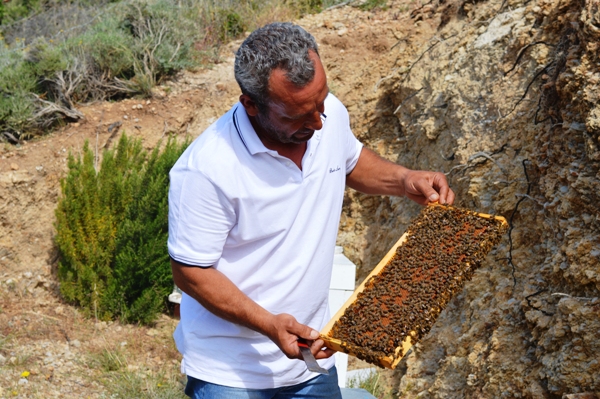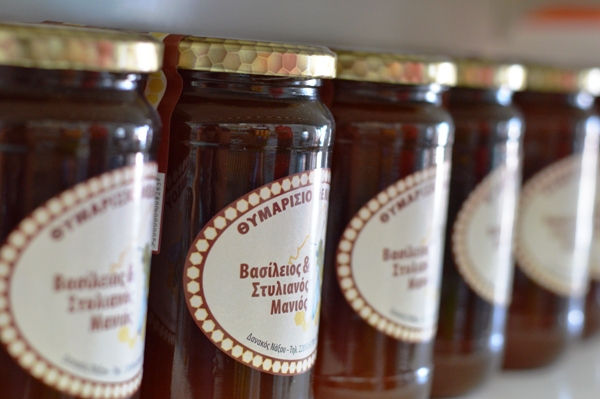Without doubt one of the many delights of visiting the Greek islands is in sampling the fresh food on offer. While here in the UK we make such a fuss about organic and ‘farm-to-table’ food, such a short and uncomplicated supply chain is still the norm in rural Greece. At one restaurant we visited for lunch the owner asked us if we wanted fresh herbs to go with our salad and he brought out a bunch of wild oregano that he’d picked on a walk earlier that morning.
But for the ultimate in simple local produce, it’s hard to beat Greek honey. On the island of Naxos I was lucky to have the opportunity to visit bee-keeper Stelios Manios on a remote hillside in the north west of the island, overlooking Abrami Bay. I was introduced to Stelios by his sister who had brought me along from the main town and offered to act as interpreter.
Stelios met us with a smile and invited us to sit on a few makeshift chairs outside his rusty caravan. I wanted to ask him about the hives on the hillside, but I soon realised that I needed to slow down and follow the time-honoured protocol. Stelios opened a plastic bag and pulled out half a dozen pastries, before producing a bottle of raki. I pointed to my watch which showed another 2 hours before midday, but my protestations were in vain and as soon as I’d sunk the raki the glass was topped up again.
The hillside is the centre of Stelios’ honey business, with around 120 hives scattered in different clusters. Stelios gave me a bee-keeper’s outfit but didn’t wear one himself. Mine had a hole in the front big enough for a small bear to pass through, so perhaps he just wanted me to enjoy feeling like a bee-keeper for a few minutes. As Stelios pulled out one honeycomb frame after another, he explained that he was looking at the density of bees within the hive to make sure they were happy and healthy. He pointed out the queen bee, larger than the others and surrounded by her swarm of subjects.
Stelios saw that I was nervous about being stung and he reassured me that he’d been stung thousands of times over the years. As if right on cue, I saw a bee land on his hand and leave its sting embedded in his thumb. He winced for a moment and then carried on.
Stelios has followed the family tradition of bee-keeping and he told me that he has hopes for one of his children to continue to manage the business. He can’t imagine a better job, he told me with a broad smile. When I asked him what it was about bee-keeping that gave him so much pleasure, he said: “I’m working together with nature: the bee-keeper takes 10 percent, nature takes 90.”
Stelios packed me off with two jars of his honey and I later discovered that it was no ordinary stuff. First I found a similar pot with the same label in the town for €20. Then I saw the look of delight on the face of the owner of our hotel when I offered her one of the jars, unable as I was to carry both back in my hand luggage. But the most telling of us was my own look of satisfaction when I opened my jar back at home and enjoyed the best honey I’ve ever tasted.






